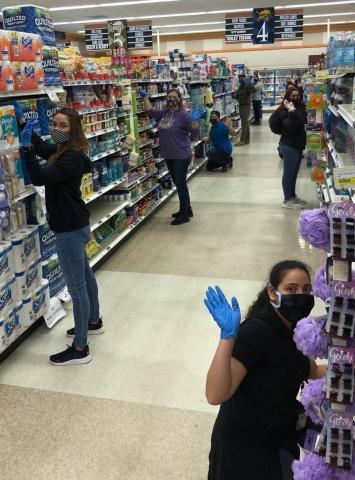DeCA to begin daily health screenings of everyone who works in commissaries on May 8

FORT LEE, Va. – On May 8, the Defense Commissary Agency will begin daily health screenings of anyone who works in commissaries – including employees, baggers and affiliated contractors – before they start their shifts.
Commissaries will initially conduct the screenings with a questionnaire that focuses on any visible symptoms related to COVID-19, and traces their travel history as well as potential connections with anyone affected by the virus.
As stores receive their infrared thermometers, the screening will include temperature checks. If a temperature check determines anyone is a potential risk, they will be directed to go home and contact their health care provider. They can return to work once they have no signs of a fever or illness, and they will be screened again.
“Military resale is good at evolving and adapting, and screening the people who work in our stores is the first step in a new normal that helps reduce the risk of transmission for everyone,” said Rear Adm. (retired) Robert J. Bianchi, DOD Special Assistant for Commissary Operations. “We should expect to operate like this for the foreseeable future.”
Bianchi, who is also the CEO of the Navy Exchange Service Command (NEXCOM), said his Navy Exchange stores are also preparing to implement these procedures for the personnel working in their facilities.
“There are probably going to be many commercial businesses that start implementing temperature checks for employees and wearing of face coverings, so this should be no surprise to anyone as they may experience this in many aspects of their personal lives,” he said.
The employee health screenings are the latest in a series of safety measures commissaries have implemented:
- Anyone (including customers) entering a store must wear a face covering
- Stores have plexiglass sneeze shields in all regular checkout lanes
- Commissary personnel wipe down checkout areas, product display cases, restrooms and shopping carts with disinfectant, and practice routine hand washing and other basic sanitation measures
- Touchless credit card processing eliminates the need for the customer to sign
- Customers scan their own ID cards so cashiers can provide them touchless transactions
- Reusable bag usage has been banned
- Only authorized customers – this includes disabled veterans with VHIC cards – will be able to enter a commissary. Visitors will no longer be allowed to accompany authorized customers and a 100% ID check is in place
- DeCA canceled special events such as the spring sidewalk sales, in-store product demonstrations (including DeCA’s free coffee program), group tours, vendor-sponsored events and other events to discourage group gatherings
- Commissaries are working with installation leadership and public health personnel to implement risk reduction practices such as designated store hours for various patron groups, and limiting the number of patrons in the store.
Commissary customers should continue to refer to the federal government’s response to coronavirus, COVID-19 website and the Centers for Disease Control and Prevention’s Coronavirus site for updates and guidance regarding this virus. Updates related to the commissaries can be found on DeCA’s Coronavirus page.
-DeCA-
PHOTO CAPTION: Anyone working in a commissary, like these employees at the Fort Greely, Alaska, store, will undergo daily health screenings before they start work. (Photo: U.S. Army Garrison Alaska)
About DeCA: The Defense Commissary Agency operates a worldwide chain of commissaries providing groceries to military personnel, retirees and their families in a safe and secure shopping environment. Commissaries provide a military benefit, saving authorized patrons thousands of dollars annually on their purchases compared to similar products at commercial retailers. The discounted prices include a 5-percent surcharge, which covers the costs of building new commissaries and modernizing existing ones. A core military family support element, and a valued part of military pay and benefits, commissaries contribute to family readiness, enhance the quality of life for America’s military and their families, and help recruit and retain the best and brightest men and women to serve their country.
